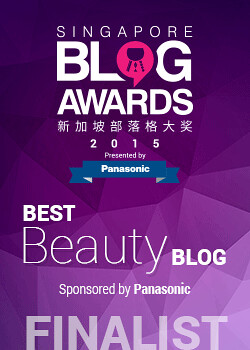
Tracy Chean, Regulatory Affairs Manager for Southeast Asia at Galderma Singapore, answering some of our questions
As a skincare geek, one of my favourite parts of the trip was the ability to get some burning skincare questions answered, and skincare myths busted by Cetaphil's own Tracy Chean, who is the Regulatory Affairs Manager for Southeast Asia at Galderma Singapore. Tracy ensures that Cetaphil and other Galderma products comply with strict safety and compliance standards, and also manages the Galderma National University of Singapore (NUS) Student Internship Programme. She graduated from NUS with a Bachelor of Science, and has also been a Singapore Licensed Pharmacist since 2010. Above that's a photo of Tracy, looking gorgeous in red! She was very friendly and willing to answer a lot of our questions, no matter how basic or esoteric they were.
The entire session was 1.5 hours long, and there was a lot of information shared during this session. During this session, Tracy helped to bust some skin myths, answer some questions about cosmetic regulations, and offer advice on a good skincare routine. Since there were quite a number of questions, I've arranged them by topic, rather than just in chronological order, so that it makes more sense to the reader. I've split the post into two - today's post will deal with skincare myths, and the next post will deal with questions on skincare routines and specific product questions.
Also, while the content of the answers is reflective of the information conveyed, it might not be the exact word-for-word answer that Tracy gave, just because I was furiously scribbling down notes during the entire session, and couldn't get down every single word said exactly. The photo below is of my notes pages from the session - you can see how much I was trying to write down! Nevertheless, the gist of each of the answers is accurate. I've also added in some editor's notes (aka my own additional thoughts) here and there to provide supplemental information where appropriate.
Cetaphil has uploaded lots of videos from the session on the Cetaphil Facebook Page. Where the videos of a particular answer is available, I've also embedded it directly below the answer - so you can hear Tracy in the flesh as well! For more of the learnings from the trip, and to see more skincare myths and questions, do check out the Cetaphil Facebook Page.
Cosmetic Basics
Q: What is the definition of a cosmetic (as opposed to a drug)?
In short, cosmetic products cannot make medical claims, unlike a drug. The regulatory definition of a cosmetics used by the Health Sciences Authority is "any substances or preparations that are intended to be placed in contact with the various external parts of the human body (epidermis, hair system, nails, lips, eyes and external genital organs) or with the teeth and the mucous membranes of the oral cavity with a view exclusively or mainly to cleaning them, perfuming them, changing their appearance, correcting body odours, protecting them or keeping them in good condition", as per the HSA website. As such, because cosmetic preparations are meant for external use, and are not intended to change or affect the body's systems and processes, cosmetics should not claim to have a therapeutic effect on your skin.
[Editor's note: This definition of cosmetics used by HSA is very similar to that used by other regulatory agencies worldwide, so cosmetics shouldn't be making therapeutic claims if they are advertised in line with their functions, regardless of which part of the world you are in.]
Q: What about cosmeticual products that make medical claims?
Actually, the term "cosmeceutical" is not a regulated or standardized term - this means that any company can call any of their products "cosmeceutical". Because cosmetic products cannot make medical claims, products advertising themselves as "cosmeceutical" are really just trying to use a marketing term to suggest to the consumer that they can provide medical benefit over "regular" cosmetics, when this is not the case. So it is purely a marketing gimmick.
[Editor's note: Interestingly, I was told by Cetaphil that there are also no "cosmeceutical grade" ingredients in the world, either. So if a product claims to contain cosmeceutical grade ingredients, it's also a marketing gimmick.]
Q: Can cosmetic products remove or reduce fine lines and wrinkles?
In short, no. But, the number one factor, as far as anti-aging is concerned, is sun protection. The only proven preventative cosmetic measure against premature aging is sun protection. So while sunscreen can help in preventing aging, a cosmetic product cannot truly remove or reduce existing fine lines and wrinkles.
There is evidence that retinoic acid is beneficial against premature aging, but it is considered a "medicine" rather than a cosmetic.
Skin Myths
Q: Is skin affected by the amount of water a person drinks?
Yes, but it's not the only factor. The skin is affected more by external factors, such as humidity, the weather, and other factors that affect TEWL: Transepidermal Water Loss, or more simply put, water loss from the skin through evaporation. Moisture is constantly lost from the skin via TEWL, so an effective moisturizer should replace lost moisture from the skin, and protect the skin from further dehydration.
Q: Is it possible to "nourish" the topmost layer of skin?
The topmost layer of skin, the stratum corneum, consists of dead skin cells. "Nourishing" the skin does not occur at the topmost layer of the skin.
[Editor's note: The stratum corneum is actually the topmost layer of the epidermis - it's the topmost of 5 layers within the epidermis, and consists entirely of dead cells and provides skin with its barrier function against bacteria, UV damage, and other external factors. The function of the epidermis is to act as a barrier against the outside world, and the stratum corneum contributes to that.]
Q: What SPF value sunscreen would you recommend? Is a higher SPF better?
In my opinion, SPF50 is good enough, because the sun protection offered by a SPF product plateaus above SPF50. With that said, I'd like to point out that the difference between SPF30 and SFP50 is 4% - that is, a SPF50 product protects 4% better than an SPF30 product. So very high SPF values don't offer significantly better sun protection. The amount of sun protection you need also depends on your lifestyle, whether you have a sedentary, indoor lifestyle, or an outdoors one.
Q: Are the dark spots on my skin due to aging?
It depends. Dark spots could be due to aging, but it could also be due to a variety of other factors, like genetics or accumulated sun damage.
Q: Do foods such as coffee, soda, sugar, caffeine, tea, and chocolate affect the skin?
People often make the link between such foods and breakouts, but this may often be due to other confounding factors. For example, stress is also correlated with breakouts, because the inflammatory hormones triggered by stress can bring about inflammatory reactions that affect the skin. And if you think about it, when are you most likely to eat such foods like chocolate and caffeine? It's precisely when you're more stressed! So as a result, people often mistakenly assume that it is the food, rather than the stress, that contributes to breakout. But actually, studies show that there is no link between the consumption of such foods and breakouts. Of course, I'd like to qualify that this doesn't apply to food allergies. If you're allergic to food, then you're allergic to it, but as far as "does this food cause acne", then there is no indication that such foods cause acne.
Hope you've enjoyed part 1 of the skincare myth-busting! For more information and more skincare information, visit the Cetaphil Singapore Facebook Page.














Very interesting. So if nothing actually helps with wrinkles then all of skincare is a lie???
ReplyDelete@MizzJ: Hmm, it's not so much that "all of skincare is a lie", but I'd say that as far as claiming to erase or remove wrinkles goes, then because a cosmetic product can't actually "remove" them, so often the product's marketing vastly exaggerates its benefits to the consumers. So the question was trying to provide a sanity check on some of the wild claims that some products make - basically if it's too good to be true, it is!
DeleteAh, mythbusting always feels refreshing. I am most interested in that last answer about foods, was it only answered in terms of breakouts? Because I've read that sugar specifically affects skin differently than that, I'm thinking more along the lines of free radicals/antioxidants, collagen production and such.
ReplyDeleteBrilliant :) Very informative and fun to read. Thanks :)
ReplyDeletethank you. Enjoy reading the articles. enhance my knowledge more about some myths of skincare.
ReplyDeleteinformative post. skincare also very much sensitive and their tons of beauty products we feel too much confused which one is the best for us. you gave good tips. thank you.
ReplyDelete